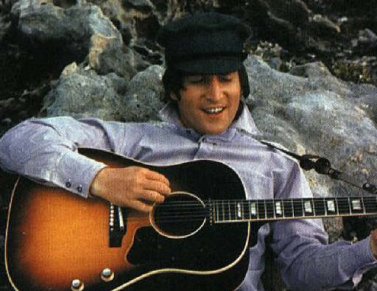
Friday, 8 December, 2000, BBC News
John Winston Lennon was born in Liverpool on October 9, 1940, the only child of Fred and Julia Lennon. His parents split when he was a toddler and he was raised by his aunt, Mary Smith. But he remained close to Julia, who encouraged him to learn the banjo, later switching to guitar. Tragedy struck when John was 17, when Julia was struck and killed by a car.
His first band was a skiffle group called The Quarrymen, named after his school, Quarry Bank High. A 15-year-old Paul McCartney joined in 1957, followed by George Harrison a year later.
After leaving school, John went to art college in Liverpool, where he met fellow student Stuart Sutcliffe.
Success first started at home for The Beatles Sutcliffe joined the group on bass, and with new drummer Pete Best and a new name, The Beatles, they secured a residency in Hamburg.
The group honed their skills playing wild, all-night concerts in the city’s notorious red light district.
Sutcliffe left in 1961 to concentrate on painting – but died shortly afterwards of a brain haemorrhage, an event which deeply affected Lennon.
Back in Liverpool, The Beatles swiftly gained a following and local businessman Brian Epstein became their manager.
After being famously turned down by Decca, the group finally secured a recording contract with EMI, with Ringo Starr replacing Pete Best on drums.
The Beatles’ first appearance at JFK airport in New York First single Love Me Do reached a modest number 17, but follow-up Please Please Me topped the UK chart. Beatlemania was born.
In 1963, John and his new wife Cynthia had a son Julian while the group went from strength to strength with a string of Number One hits, conquering the US the following year.
By the mid-60s, The Beatles were the world’s biggest band, and Lennon & McCartney’s songwriting skills were developing at breathtaking speed.
With producer George Martin they expanded the parameters of pop music, achieving new levels of sophistication on the albums Rubber Soul and Revolver.
They gave up touring for good after Lennon said the Beatles were more popular than Jesus, and the band received death threats.
The Beatles’ career peaked in 1967 with the release of the psychedelic classic Sgt Pepper’s Lonely Hearts Club Band. But the same year saw Brian Epstein die of a drugs overdose.
The 1969 “bed-in” for peace Lennon’s love life was also in turmoil and he finally left Cynthia for avant-garde artist Yoko Ono.
They married in 1969, shortly before embarking on their famous series of “bed-ins” aimed at spreading a message of world peace.
Relations within the Beatles were strained – despite the success of the White Album – and 1970 saw them split.
By this time, Lennon’s solo career was well under way after the release of his Unfinished Music records with Yoko, and the Plastic Ono Band’s Cold Turkey – which described the pain of heroin withdrawal.
The couple became involved in politics John and Yoko became immersed in political causes, and Lennon performed Instant Karma on Top of The Pops with cropped hair as an anti-war protest.
1971 was his most productive year as he moved to New York and released the acclaimed solo albums Plastic Ono Band and Imagine.
Plastic Ono Band featured Working Class Hero and Mother, which saw him scream out for his late parent – a world away from his Beatles work.
Imagine’s title track became synonymous with him after his death, while it also contained a bitter attack on Paul McCartney (How Do You Sleep?) and Jealous Guy, which was overlooked until Bryan Ferry’s 1980s cover version.
Lennon’s 1973 album, Mind Games, explored the problems he was having with Yoko, and the couple split for a time, with him going to Los Angeles on a drugs and alcohol binge. They were reunited after a concert appearance with Elton John in November 1974.
The couple had a son, Sean, and John took a five-year break to raise him. In 1980 he, returned with the album Double Fantasy, which went to number one in countries around the world.
He appeared to be set for a period of unprecedented creativity – but his life was cut short outside his home at the Dakota building, near Central Park.
Lennon was survived by Yoko, Sean, and Julian, his son from his marriage to Cynthia.
His assassin, had an application for parole turned down in October 2000.
